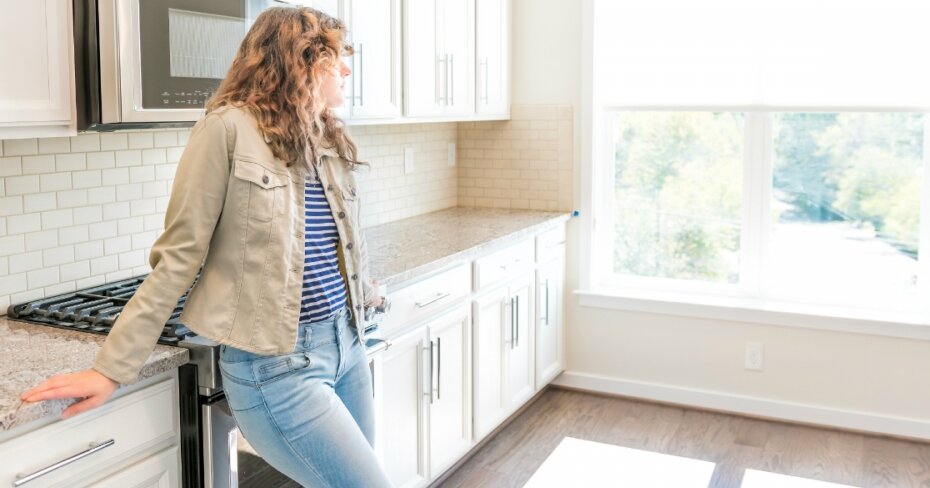We spoke to experts about how COVID-19 will impact Canadian homebuying
By: Zandile Chiwanza on March 18, 2020
Canada is about to enter the busy homebuying season. In a normal year, you’d have open houses, homebuyers debating fixed or variable rates and a flood of calls to brokers and real estate agents.
But this is not a normal year.
There’s been a lot of uncertainty for homebuyers in the past few weeks. Real estate agents have talked about cancelling open houses and those that have kept them going have stepped up sanitization measures. Experts are speculating we may see a pause in the Canadian housing market as governments are expanding social distancing amid the COVID-19 pandemic, and the industry moves to ensure that homebuyers and sellers stay protected during the outbreak.
So, given everything that’s going on with this new coronavirus, should you put your house-hunting efforts on hold? Or is it still possible to buy a home in this market? We spoke to some experts about what’s going on right now.
Social distancing to disrupt the housing market
Ontario’s provincial government declared a state of emergency on Tuesday, which limits large gatherings of 50 people or more and closed down several public institutions such as libraries, cinemas and daycare centres.
In the event the provincial government enforces a wider and broader shutdown, John Pasalis, president of real estate brokerage Realosophy, thinks the real estate market will also shut down as both sellers and buyers will hit pause entirely on the spring homebuying season.
“We'll probably see both a decline in home sales and new listings,” Pasalis said.
In this type of environment, buyers are not going to want to go out to look at homes and potentially put themselves at risk and sellers will not want strangers in their home either. In addition, the services that support the real estate industry such as stagers, movers, photographers and home inspectors will stop working which will make it nearly impossible for agents to bring homes to the market for sale.
The likelihood of a surge in listings while we’re practising social distancing and others are in self-isolation is slim.
As of yesterday, it was still business as usual but some in-person open houses have already been cancelled.
“It's a little bit different than the financial crisis, or even the decline we saw in 2017, where we didn't have this sort of external factor like the virus that might even just prevent people from going out.”
Affordability still an issue right now
Before COVID-19 wreaked havoc on the global economy many aspiring homebuyers were sidelined from the real estate market in Toronto because of the sky-high prices and low inventory. By the end of last year, for example, the average cost of a Toronto condo hit $617,658.
To combat the effects of the coronavirus outbreak on the economy, The Bank of Canada cut its benchmark interest rate by 50 basis points to 0.75%, making it more affordable for some Canadians to get a mortgage.
From an affordability perspective, the central bank's emergency rate cut could see more Canadians taking advantage of a cheaper mortgage rate.
“A lot of people who are serious buyers still want to buy a house. If they have their down payment, they have their jobs, they’re not concerned,” said Pasalis.
Let’s say you have $70,000 saved up and not tied up in the stock market and you were already house-hunting, now seems like the right time to use the money to apply for a mortgage while the variable rates are still as low as 1.90%.
Pandemic or not, Chadene Mbouogno, mortgage agent at CM Lending, said buying within your means remains the number one priority.
“You really have to do your math,” Mbouogno said. “The mortgage is not the only cost of being a homeowner. And a lot of people forget that. That's why it's so important to get pre-approval and to speak with a mortgage agent.”
So, if you're working in a field where you’re unsure of your job security, making such a big financial commitment as buying a house and tying yourself to a contract where you have to make a minimum payment over the next few years is probably not the wisest move.
“If you're really that worried, then hit pause and if you're not, make sure you're buying within your means,” Pasalis said.
Should you be worried about a major recession?
Canadians have been plagued with recession fears for the past 10 years, but as the COVID-19 pandemic escalates, so too do the rumours that we’re likely on the brink of a global recession.
For those who were ‘waiting for a recession to buy a home’, there are risks that you need to consider.
“The challenge is knowing to what extent we're going to be going into a recession and how long it's going to last,” Pasalis said.
The global financial crisis in 2008 lasted just seven months in Canada much shorter than experts expected. It's impossible to predict how long it would last this time.
There’s also no guarantee a recession will impact house prices. Shawn Stillman, mortgage broker and co-founder at Mortgage Outlet said that a recession will not solve Toronto’s housing affordability issue.
“The only way to change housing affordability is to decrease the demand for houses. You can't change housing affordability when the supply does not keep up with the demand,” Stillman explained.
“The minute housing prices go down in Toronto, people are going to jump on the market and try to snap them up. So it's not a demand issue, which is what a recession solves, the supply issue is the problem.”
In the event house prices do collapse, remember that also doesn’t automatically make the market easier to enter.
“If you're lucky enough to have house prices drop, surprise, everyone is waiting,” said Liz Enriquez, founder of Ambitious Adulting.
“And there are people with a lot of money who are also waiting, meaning competition is still a hurdle.”
Enriquez outbid 11 other people for her first house in 2016 by overbidding $40,000 and only going in with one condition. Because she had the savings, she was able to do that.
“The way the world works is the more money you have, the more competitive you can be,” Enriquez said.
“It's not a level playing field but some people will get lucky. There's going to be those first-time homebuyers who are in the perfect time, have a good job, have good savings, and then the housing prices go down and they're gonna scoop one up and it's gonna be great for them. But it sounds like the lottery.”
As an aspiring homebuyer in the times of COVID-19, Pasalis encourages people to stay calm.
"The key is you don't really want to be trying to time the market because you don't know how the market is going to respond,” Pasalis said.


